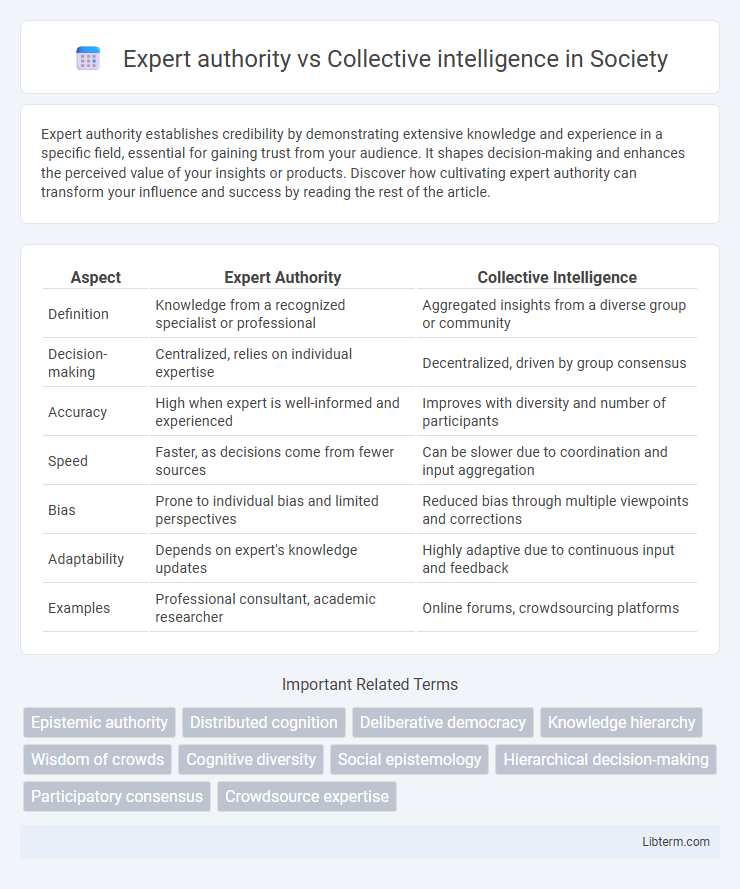Expert authority establishes credibility by demonstrating extensive knowledge and experience in a specific field, essential for gaining trust from your audience. It shapes decision-making and enhances the perceived value of your insights or products. Discover how cultivating expert authority can transform your influence and success by reading the rest of the article.
Table of Comparison
| Aspect | Expert Authority | Collective Intelligence |
|---|---|---|
| Definition | Knowledge from a recognized specialist or professional | Aggregated insights from a diverse group or community |
| Decision-making | Centralized, relies on individual expertise | Decentralized, driven by group consensus |
| Accuracy | High when expert is well-informed and experienced | Improves with diversity and number of participants |
| Speed | Faster, as decisions come from fewer sources | Can be slower due to coordination and input aggregation |
| Bias | Prone to individual bias and limited perspectives | Reduced bias through multiple viewpoints and corrections |
| Adaptability | Depends on expert's knowledge updates | Highly adaptive due to continuous input and feedback |
| Examples | Professional consultant, academic researcher | Online forums, crowdsourcing platforms |
Understanding Expert Authority: Definition and Scope
Expert authority refers to the recognized knowledge and credibility held by individuals with specialized skills or extensive experience in a particular domain, often validated through academic credentials, professional achievements, or peer recognition. This form of authority is critical in decision-making processes where precise, reliable information is required, as experts possess deep insights that go beyond general understanding. The scope of expert authority typically encompasses advisory roles, policy formulation, and problem-solving within complex fields such as medicine, law, and engineering, where their expertise ensures accuracy and trustworthiness.
Collective Intelligence: A Comprehensive Overview
Collective intelligence harnesses the diverse knowledge, skills, and perspectives of a group to solve complex problems more effectively than any individual expert. This collaborative approach leverages crowdsourcing, collaborative platforms, and networked communities to generate innovative solutions, enhance decision-making, and adapt to rapidly changing environments. Research demonstrates that collective intelligence outperforms expert authority in contexts requiring creativity, flexibility, and the integration of varied expertise.
Historical Evolution: Experts vs. the Wisdom of Crowds
The historical evolution of expert authority versus collective intelligence reveals a shift from centralized knowledge held by specialized individuals toward embracing the distributed insights of diverse groups. Early societies relied predominantly on expert authority, where scholars and leaders curated and controlled information, establishing expertise through rigorous education and experience. In contrast, the modern era increasingly values collective intelligence, leveraging crowd-sourced data and collaborative problem-solving to enhance decision-making accuracy and innovation across various fields.
Key Differences Between Expert Authority and Collective Intelligence
Expert authority relies on the knowledge and decision-making power of individuals with specialized expertise, often resulting in faster, more confident solutions in complex fields. Collective intelligence aggregates diverse perspectives and experiences from a group, enhancing creativity and problem-solving through collaboration but sometimes leading to slower consensus. Key differences include reliance on individual expertise versus group input, speed of decision-making, and the scope of knowledge considered.
Advantages of Relying on Expert Authority
Relying on expert authority ensures access to specialized knowledge and experience, leading to accurate and reliable decision-making in complex scenarios. Experts provide nuanced insights based on extensive training and proven methodologies, which reduces the risk of errors common in collective judgments. This approach accelerates problem-solving by focusing on trusted individuals with a deep understanding of the subject matter.
Benefits of Harnessing Collective Intelligence
Harnessing collective intelligence aggregates diverse perspectives and expertise, resulting in more innovative problem-solving and decision-making processes. It leverages the wisdom of crowds, increasing accuracy and reducing individual biases present in expert authority models. This collaborative approach enhances adaptability and fosters continuous learning within organizations and communities.
Common Challenges: Biases and Limitations
Expert authority often faces the challenge of cognitive biases such as confirmation bias and overconfidence, which can limit the accuracy and scope of their insights. Collective intelligence, while benefiting from diverse perspectives, struggles with groupthink, social conformity, and information cascades that can skew consensus decisions. Both approaches require mechanisms to identify and mitigate these biases to enhance decision-making reliability and validity.
Practical Applications in Decision-Making
Expert authority leverages specialized knowledge and years of experience to provide precise guidance in complex decision-making scenarios, ensuring accuracy and reliability. Collective intelligence aggregates diverse insights and perspectives from a group, enhancing creativity and uncovering innovative solutions through collaborative problem-solving. Practical applications include strategic business planning, where expert authority offers focused expertise, while collective intelligence enables adaptive and inclusive decision processes in dynamic environments.
Hybrid Models: Integrating Experts with Collective Input
Hybrid models combine expert authority with collective intelligence to enhance decision-making accuracy and innovation. By integrating specialized knowledge from experts with diverse insights from collective input, these models leverage the strengths of both to solve complex problems effectively. This fusion enables adaptive, scalable solutions that benefit from authoritative guidance while incorporating broad perspectives and real-time data.
Future Trends: Balancing Expertise and Crowd Wisdom
Future trends in decision-making emphasize balancing expert authority with collective intelligence to enhance accuracy and innovation. Emerging technologies enable seamless integration of expert insights and crowd-sourced data, fostering adaptive, data-driven solutions across industries like healthcare and finance. Organizations leveraging hybrid models of expertise and crowd wisdom demonstrate improved problem-solving capabilities and resilience in complex environments.
Expert authority Infographic

 libterm.com
libterm.com